

PopEntertainment.com
> Feature Interviews - Producers >
Features Interviews A to E
> John Altschuler and Dave Krinsky
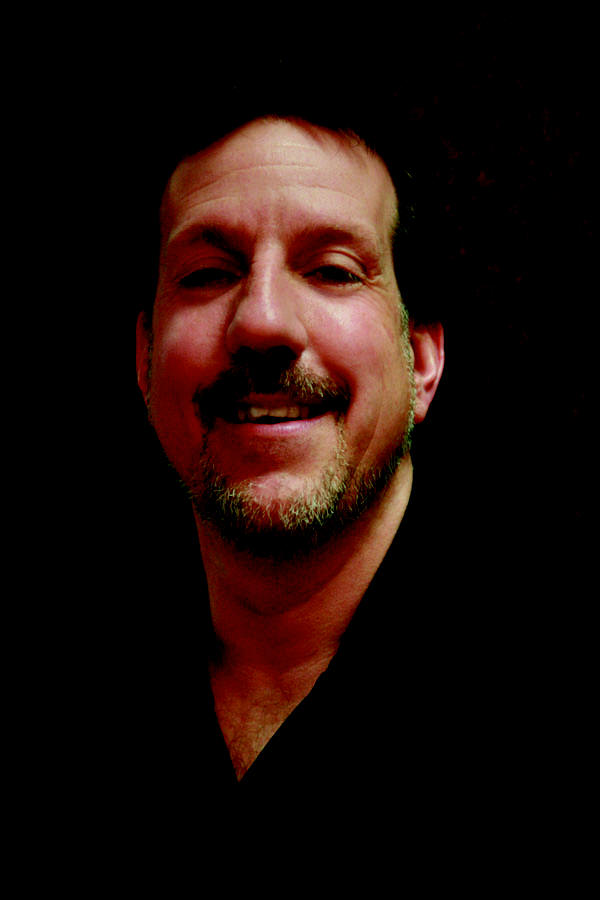 John
Altschuler and Dave Krinsky
John
Altschuler and Dave Krinsky
Kings of the Hill
by Jay S. Jacobs
Copyright ©2007
PopEntertainment.com. All rights reserved. Posted: January 26, 2007.
There’s a dirty little secret that
Hollywood
doesn’t tell all the people who move there in pursuit of wealth and power
from working in television. Even if you get involved with a popular show –
and that’s certainly a long shot to begin with – it’s rare that your job
will last more than about five years. It’s a real abnormality for a show
to last much more than that. Series often will
have the white hot popular moment and then fade away as quickly as they
appeared. (Twin Peaks or Ally McBeal, anyone?)
Slow
and steady has never been the prevailing wisdom in Hollywood. It’s the way
of life in the fictional town of Arlen, Texas, though. Arlen is the setting
of the subtly insightful animated comedy King of the Hill, which is –
unbelievably – starting its eleventh season on the
air. The series, like the lifestyle it portrays, is quiet, laid back,
reserved, thoughtful and much smarter
and funnier than you’d originally expect. Created
by Austin, Texas auteur Mike Judge – who also created that much more
frenetic classic MTV cartoon Beavis and Butthead as well as the cult-classic
film Office Space – the reins have since been turned over to
executive producers and writers John Altschuler and Dave Krinsky.
Altschuler and Krinsky were relatively unknown in television circles in 1998
when they became staff writers on the series, but over the years they have
worked their way up the ladder and earned the total trust of Judge. Judge
is still very involved in the direction of the show and does voices
including that of lead character Hank Hill – a right-leaning propane
salesman who believes in God, football, propane,
family and the importance of having a good
set of tools. However, the uniquely quirky voices
of Hank and his friends and family are marshaled by the two
executive producers who bucked the odds and found
a steady long-term gig in the most short-term of industries.
Shortly before the eleventh season premiere was
due to air, Altschuler and Krinsky sat down with us to chat about life with
the Hills.
I read that you met at
the
University
of North Carolina. How did the two of you become a team?
John Altschuler:
Well, oddly enough, there was this guy in my English class sophomore year,
who said, “Yeah, you’re pretty funny. My roommate is funny. You should
meet him.” It was Dave.
Dave Krinsky:
Then we met and at the time there was a student-run cable network just
starting up and we thought: We have a lot of the same comedic background.
We really should do a show together. So we did.
How did you get involved in your first series,
The High Life? I know it didn’t last for too long, but it was supposed
to be a really good show…
John Altschuler:
It lasted eight episodes. What happened was, Dave and I, when we were in
college we had written some stuff and got published by National Lampoon
–
back when it existed… We came out here and were production assistants –
gophers – for like two and a half years. We had finally sold a screenplay
or two, but nothing had been produced, when we got a call, virtually out of
the blue, from this woman – Carolyn Strauss at HBO, who had read our
screenplay. She said, “Look, we’ve got this new show…
[It's created by] this guy Adam Resnick
[and made by] Worldwide Pants [David Letterman’s
production company]… Will you
take a look at it?” We loved it. Dave and I were sharing an apartment in
Burbank. We were paying $650.00 a month rent. It was a two-bedroom
one-bath. We loved it. She goes, “Would you guys move to New York to work on it?” We were, like, doing nothing… We were like, uhh,
yeah… She goes, “Can you move in three days?” So we literally just sort of
packed, locked up the apartment and three days later we were at the Ed
Sullivan Theater in
New York,
working for Adam Resnick, doing The High Life.
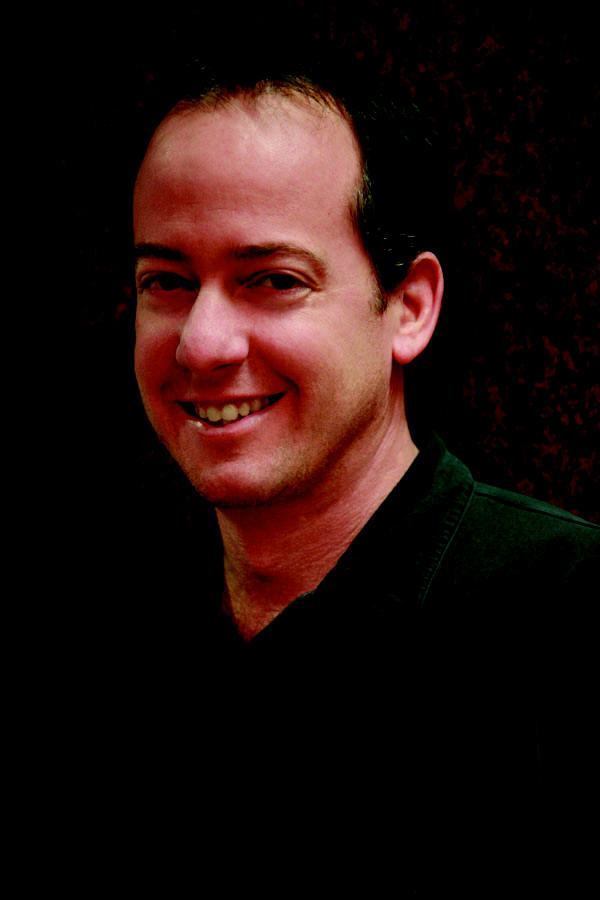 King
of the Hill is going into its eleventh season. When you started
working on the show – I believe in 1998 – could you have ever imagined that
in 2007 you’d be not only still working on the show, but be the supervising
executive producers?
King
of the Hill is going into its eleventh season. When you started
working on the show – I believe in 1998 – could you have ever imagined that
in 2007 you’d be not only still working on the show, but be the supervising
executive producers?
Dave
Krinsky: No
way. Early on, I thought every year if we last another year we’d be
pleased.
John Altschuler:
The one thing… Mike Judge liked our take and thought that it
was very grounded and real early on. So we always knew there was a little
bit of a connection there. It just got stronger and stronger. Then, lo and
behold, we’ve been running it the last six or seven seasons.
You are sort of in the heart of arguably the greatest time for adult
animation – with shows like your own,
the Simpsons, Family Guy,
Mike’s old series Beavis and Butthead… Why do you think
animation is so trenchant for our time?
John Altschuler:
You know, I apologize for not having a great answer. I think that
what we’ve seen about animation – at least in our perspective, and I think
this goes throughout – is that a lot of these
things, from South Park to King of the Hill deal with
the serious world around you. Animation allows you just a little bit of
distance so you can really laugh.
The creators of
the Simpsons have
often said that they can get away with a lot of things just because they are
animated that they would never be able to in a live action series…
Dave Krinsky:
Well, they can. We can’t.
John Altschuler:
We’re not allowed to. You wouldn’t believe. We’re like literally… [With]
Standards and Practices, we’re complaining, wait, they can do this on The
Simpsons… They go, “Well, that’s a cartoonish show. You’re a real
show.” So you’re like (dejected) okay… It really is frustrating,
because our standards issues are much stricter.
How do you keep it fresh after so many seasons?
Dave Krinsky:
I think the key to that lies first in the characters that Mike created.
Because, they are just really interesting, layered characters. By keeping
them constant, we can use whatever is going on in the world to explore
through our characters. Since there is always something changing in the
world, something to piss Hank Hill off, there always seems to be grist for
the mill.
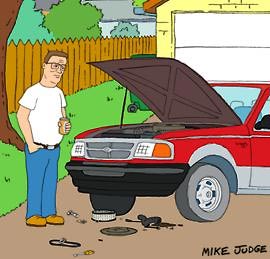 With
the cultural divide right now in this country between the red states and the
blue states – is it a bit of a balancing act to keep the Hills true to
themselves and their beliefs without condescending towards them or making
them less likable?
With
the cultural divide right now in this country between the red states and the
blue states – is it a bit of a balancing act to keep the Hills true to
themselves and their beliefs without condescending towards them or making
them less likable?
John Altschuler:
To be blunt, we sort of see it like nothing about this show has
changed. This cultural divide, you know, I think I’ve heard about it
through my entire life and I’m 43 years old. It ain’t going anywhere. It’s
been there. What is interesting about our show is it’s simply a middle
American look at the elite. Okay, well that ain’t going anywhere. The fact
is, we’re as popular in Michigan as we are in Florida as we are in… Because
we have a very centrist, common sense approach to all these issues.
Look: red state, blue state… When you’ve got one state that’s
within a thousand votes of each other, the fact that one’s the color red and
[the other is] the color blue doesn’t really mean anything.
Dave Krinsky:
But your point about the word condescension is important here, because we
always try to police that. We don’t want to be condescending towards our
characters because we identify with them. We think our fans identify with
them.
I
saw an old interview that John did with your college UNC in which you said
that you were trying to make Arlen seem like a new Mayberry – a slow-paced
easy-going southern town rather than the big bustling cities or suburbs
which usually get much more airplay. Why do you think this lifestyle
doesn’t always get its due on television and film?
John Altschuler:
You know, my only theory is because maybe too many or a great deal of the
people involved in our industry are from
New York or
Los Angeles
or believe that their destiny lies in
New York or
Los Angeles.
So, you have people appealing to themselves and
preaching to the choir. I think that’s part of the problem of everything
being set in Los Angeles and New York. One thing that’s kind of nice is
that Mike Judge is based in Austin and Dave and I just… you know, we don’t
dislike Los Angeles, but we have very strong roots in other places.
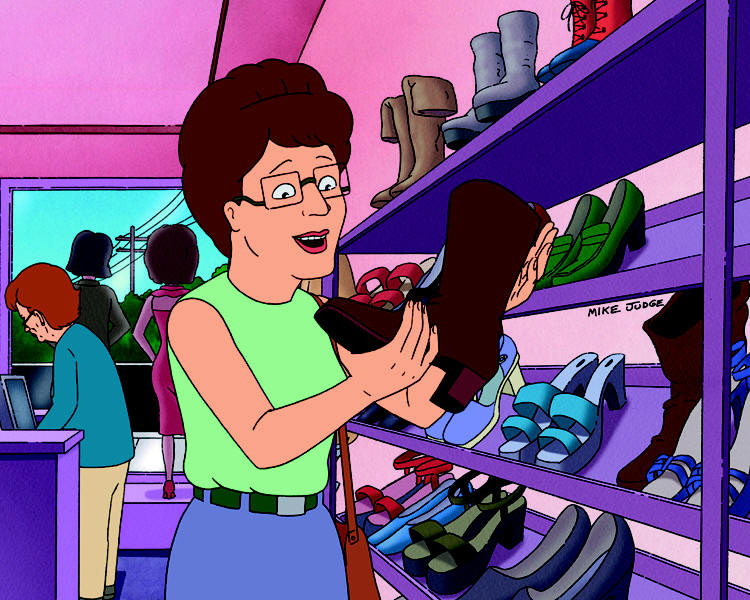 With all the great voice talent you have – Mike, of course, and people like
Kathy [Najimy] and Brittany [Murphy] and Stephen [Root] – do you write with
their voices in mind?
With all the great voice talent you have – Mike, of course, and people like
Kathy [Najimy] and Brittany [Murphy] and Stephen [Root] – do you write with
their voices in mind?
John Altschuler:
You know, they’re just so good that we don’t even… This is going to sound
odd, but we stay true to the characters. The fact is, when the characters
are consistent, they can pull off anything we send their way. So it’s
mostly just a luxury to know that as complex, as weird as… whatever we throw
at them as long as the character is consistent, they are going to be able to
pull it off.
You also get an incredible amount of celebs to do voicework for the show –
Tom Petty, Johnny Depp, Brad Pitt, Jennifer Aniston, Lisa Kudrow, Meryl
Streep, Willie Nelson and many others. Does it surprise you that such huge
names want to be on your show, and why do you think that they are so into
it?
Dave Krinsky:
I think that part of the appeal is that they are able to do
work here that is hard to find anywhere else. We take on a lot of
interesting issues that other shows don’t take on. We have very vivid
characters that people seem to find attractive. I also find they really get
a kick out of working with our regulars. Whenever any of these big stars
come in and come to our table read, they’re just kind of looking around at
all our regulars. They just seem amazed by their abilities.
John Altschuler:
I think Dave’s right. The subject matter that we deal with. The depth of
each script. This is a very difficult show to write. It’s a level of
writing… and you can see it – from Ben Stiller to Brad Pitt – you can just
see them light up because it’s a level of writing that isn’t out there very
much. Then, to be honest, there’s no hair and makeup. I think they love
the idea that they can come in and record and there’s no cameras on them and
they can really inhabit a new and different character.
You have a movie called
Blades of Glory in
production with Will Ferrell, Jon Heder and Will Arnett. What is the film
going to be about and how is movie-making different than working on TV?
Dave Krinsky:
Well, the movie is about: Will Ferrell plays the bad boy of figure skating,
if you can picture something like that. Jon Heder plays the golden boy.
They are fierce rivals until they tie at a tournament. They’re both up on
the podium and they end up getting in a fight on the podium and all mayhem
breaks loose. They get banned from the sport for life – until they find a
loophole, which is that they can return to skating if they skate together as
a male tandem.
John Altschuler:
They can skate in pairs, but none of the decent women skaters will skate
with them. So they are kind of trapped that way. I think that the hardest
thing… look, on King of the Hill, we have virtual complete control.
So, you know, look – great directors on Blades of Glory, great
producers, great cast… but it is frustrating when you’re not deciding what’s
staying and what’s going.
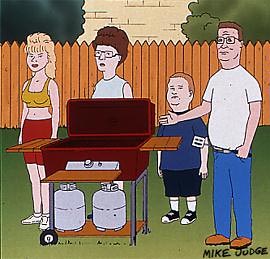 I
also saw you were doing a script for
Leisureworld. Is screenwriting something you want to take up more, or
are you looking to juggle TV and film?
I
also saw you were doing a script for
Leisureworld. Is screenwriting something you want to take up more, or
are you looking to juggle TV and film?
John Altschuler:
We like them both. What’s interesting is that different ideas are
attractive to us. Some things are better as movies, some things are better
as TV shows. We love King of the Hill. As long as it’s good – and
what’s nice is that every year we can decide with Mike: Are we going to do a
new season? Everybody can decide, oh, do we want to do another season? So
every year we can go, is there a reason to do more? That’s great. Then,
the fact is that Dave and I have always written movies. We have independent
movies that we’re producing. Then there’s rewrite work. We just enjoy
dealing with the different… whatever. Just different worlds.
In the end, how would you like for people to look at your work?
John Altschuler:
I’d like them to think that it was funny and stupidly smart.
Dave Krinsky:
Yeah, I think the one thing we both keep in our heads all the time is we
kind of have Mike Judge and Adam Resnick looking over our shoulders –
whether they’re there or not. Because we always figure if we can make those
guys laugh and not write anything that would embarrass us to them, then
we’re doing well.
Are there any misconceptions you’d like to clear up?
Dave Krinsky:
You know there are some misconceptions about it. I don’t know if I want to
clear them up. I sort of enjoy how some people who don’t know the show
think we’re making fun of rednecks. It’s just kind of fun that they’re
missing the ideas on family. Let the family watch and see what we’re
doing. It’s gratifying to hear that.
John Altschuler:
I think Dave’s right. We seem to anger extremes on both sides. Look, I’ve
got to tell you, we don’t have political agendas. We just like to look at
every situation individually and that’s I think what keeps it fresh and
interesting. It is kind of neat because people… we heard somebody one time
say, “Well, what side are you on?” I was like; we’re on the side of funny
entertainment. There’s no side. But it is interesting because we pretty
much… fortunately our goal is not to anger anybody. Our goal is not to be snarky and edgy. So, the vast bulk of people are on our side and appreciate
it. But it’s also gratifying to see the few people hopping around on both
extremes.
Copyright ©2007
PopEntertainment.com. All rights reserved. Posted: January 26, 2007.
Features
Return to the features page
